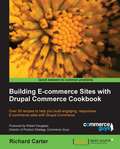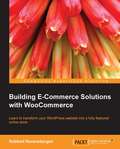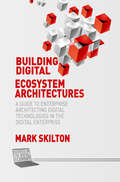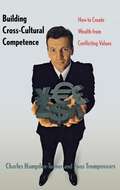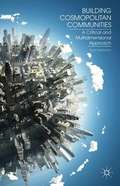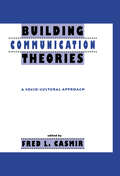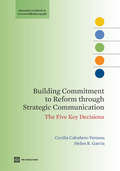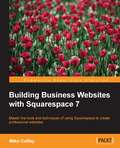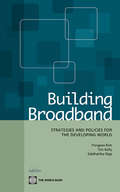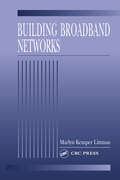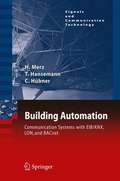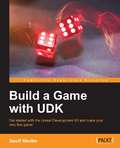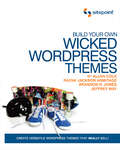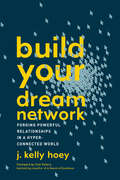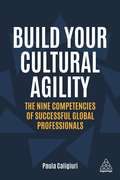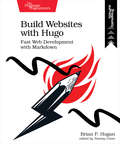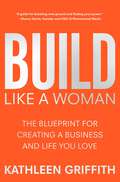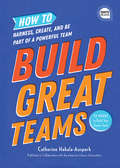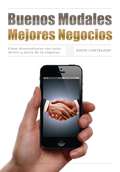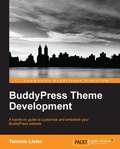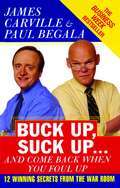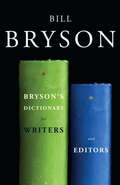- Table View
- List View
Building E-commerce Sites with Drupal Commerce Cookbook
by Richard CarterBuilding eCommerce Sites with Drupal Commerce Cookbook is written in a helpful, practical style with numerous hands-on recipes to help you build attractive eCommerce sites.This book is primarily for store owners and web designers with little or no experience of Drupal and Drupal Commerce who want to build and customise a store in Drupal Commerce. You will have a basic knowledge of websites, but you don't need to be familiar with Drupal or PHP. However, this book would also suit experienced Drupal and Ubercart users who want to migrate to or build a Drupal Commerce store
Building E-Commerce Solutions with WooCommerce
by Robbert RavensbergenBuilding E-Commerce Solutions with WooCommerce is a step-by-step tutorial with informal but informative tone.This book is written for users with an existing WordPress website who want to add e- commerce functionality to their current solution. This book is also suitable for web design agencies working with WordPress. As a pre-requisite, it is assumed that you already have some experience of PHP and using WordPress.
Building Digital Ecosystem Architectures: A Guide to Enterprise Architecting Digital Technologies in the Digital Enterprise (Business in the Digital Economy)
by Mark SkiltonThe design of digital solutions has become a pressing concern for practitioners faced with a plethora of technology impacting their business. From cloud computing to social networks, mobile computing and big data, to the emerging of Internet of things, all of which are changing how enterprise products, services, rooms and buildings are connected to the wider ecosystem of networks and services. This book defines digital ecosystems with examples from real industry cases and explores how enterprise architecture is evolving to enable physical and virtual, social, and material object collaboration and experience. The key topics covered include:Concepts of digitizationTypes of technological ecosystemsArchitecting digital workspaces Principles of architecture design Examples architecting digital business models Examples of digital design patterns Methods of monetizationConclusions
Building Cybersecurity Applications with Blockchain and Smart Contracts (Signals and Communication Technology)
by Emmanuel Bertin Nour El Madhoun Ioanna DionysiouThis book offers an in-depth exploration of the application of blockchain and smart contract technologies in the field of cybersecurity. It begins by defining the fundamentals of cybersecurity in the context of blockchain and smart contracts, and then moves on to the world of e-government services, describing how blockchain can enhance the security of these services. The book also explores how blockchain can secure the Internet of Things (IoT), focusing on applications such as securing drones and protecting robotic networks. The importance of scalability in distributed replication systems is also discussed, with a particular focus on sharding. Finally, the book looks at the challenges of data protection in distributed ledger and blockchain technologies, providing both an analysis of the problems and solutions. Written by academic researchers and industry experts, this book offers a comprehensive and nuanced perspective on the transformational potential of blockchain and smart contracts in the field of cybersecurity.
Building Cross-Cultural Competence: How to Create Wealth from Conflicting Values
by David Lewis Charles Hampden-Turner Fons TrompenaarsBased on 14 years of research involving nearly 50,000 managerial respondents and on the authors' extensive experience in international business, this book uses humor, cartoons, and numerous business examples to show managers how to reconcile cultural differences in the workplace.
Building Cosmopolitan Communities
by Amos NascimentoBuilding Cosmopolitan Communities contributes to current cosmopolitanism debates by evaluating the justification and application of norms and human rights in different communitarian settings in order to achieve cosmopolitan ideals. Relying on a critical tradition that spans from Kant to contemporary discourse philosophy, Nascimento proposes the concept of a "multidimensional discourse community. " The multidimensional model is applied and tested in various dialogues, resulting in a new cosmopolitan ideal based on a contemporary discursive paradigm. As the first scholarly text to provide an interdisciplinary survey of the theories and discourses on human rights and cosmopolitanism, Building Cosmopolitan Communities is a valuable resource to scholars of philosophy, political science, social theory, and globalization studies.
Building Communication Theories: A Socio/cultural Approach (Routledge Communication Series)
by Fred L. CasmirConcern with various matters related to humans as they communicate has led to an increase in both research and theorizing during the second half of the 20th century. As a matter of fact, so many scholars and so many disciplines have become involved in this process that it is virtually impossible to understand and appreciate all that has been accomplished so far. This book focuses on one important aspect of human sense-making -- theory building -- and strives to clarify the thesis that theories do not develop in some sort of social, intellectual, or cultural vacuum. They are necessarily the products of specific times, insights, and mindsets. Theories dealing with the process of communication, or communicating, are tied to socio-cultural value systems and historic factors that influence individuals in ways often inadequately understood by those who use them. The process-orientation of this book inevitably leads to an emphasis on the perceptions of human beings. Thus, the focus shifts from the subject or area called "communication" to the act of communicating. Finally, this volume offers insight into how the process of human sense-making has evolved in those academic fields commonly identified as communication, rhetoric, speech communication or speech, within specific socio-cultural settings.
Building Commitment to Reform through Strategic Communication
by Helen R. Garcia Cecilia Cabañero-VerzosaStrategic communication is a powerful tool for creating broad-based support for reform and change initiatives. Much has been written about why communication matters in reform efforts, but there is scant material available to help those who manage reforms apply communication concepts and approaches to their own programs and policy-reform initiatives. 'Building Commitment to Reform through Strategic Communication' attempts to bridge that gap. The authors present a pragmatic and systematic approach for reformers ready to use communication strategically to achieve their reform goals. The Five Communication Management Decision Tool helps reformers and their teams develop a framework for their communication strategies. This decision tool helps managers see change initiatives through the eyes of those who will be affected by the reforms. When the decision tool is used in the early stages of the development of change programs, reformers gain an even deeper understanding of the stakeholders' perspectives on the reforms, which influence stakeholder opposition or support for them. Such understanding will not only be instructive, but possibly transformative-for both change agents and those stakeholders whose support is critical to the success of reform. Reform agents may recognize the source of stakeholder resistance and be able to revise reform goals and redesign change interventions. Stakeholders who have a shared understanding of why the status quo is not acceptable and change is necessary are more likely to create coalitions of committed allies and supporters who will work together to achieve reform goals. This workbook illustrates how the decision tool can be used for various types of change and reform initiatives-from policy reform, to country and donor partnership agreements, to sectoral reforms. Tested and used in learning interventions across cultures, regions, and sectors, the tool has been used successfully by teams in government, nongovernmental organizations, the business sector, and donor agencies. The book will be of great interest to readers working in all of these areas.
Building Business Websites with Squarespace 7 - Second Edition
by Miko CoffeyDiscover the best way to build, design and launch professional websites with Squarespace quickly, without needing to learn any code About This Book • Discover time-saving tricks and best practices, and avoid common pitfalls while creating a website • Create visually stunning Responsive Design templates for your website with Squarespace 7 • Understand how to monitor, measure, and manage your website after launching it Who This Book Is For This book is ideal for anyone who wants to learn how to use the latest version of Squarespace to create a website from scratch and take it through to go-live. You don't need any prior experience with Squarespace, HTML, or CSS, or building websites in general as everything is done using Squarespace's simple, browser-based interface. What You Will Learn • Develop an essential Website Toolkit that will act as reference and materials for your entire project, ensuring you stay on-target to meet your objectives • Set up your Squarespace account, learn how the interface works, and select the correct template for your website's purpose and goals • Create your website framework, fill it with content, and arrange your pages using Squarespace's easy drag-and-drop tools • Customize your site's look and feel to match your brand, and create a stunning visual impact for your website on all types of devices, including mobiles and tablets • Configure the core functions your business needs, whether connecting to social media, promoting events, showcasing your work, or selling goods and services online • Learn time-saving tricks and how to avoid common pitfalls from an experienced professional with years of Squarespace experience • Gain valuable insights about search engine optimization, communicating effectively online, and other e-marketing advice • How to monitor, measure, and manage your website post-launch In Detail Squarespace is a web-based tool that allows non-technical people to create and manage professional-looking websites quickly, without needing to write any code. It empowers business owners to take total control of their own websites, without needing to pay someone to design or maintain it. This book covers much more than just how to use Squarespace. It covers all aspects of creating a successful business website, from developing your brand identity, to writing and structuring content to match your target audience's needs, and dozens of other other valuable tips that will help your website shine. Most importantly, you'll learn the correct steps to follow in order to ensure your project is smooth and stress-free. The book starts by helping you plan your website project and gather all the raw materials you'll need. Next, you'll set up your account and become familiar with the terminology and tools that you'll be using. Once you've learned the basics of how the Squarespace interface, templates, and different page types operate, you will create the framework of your website, ready for you to insert content and functionality. Then, once all the core elements are in place, you'll apply the aesthetic fine-tuning needed to bring your website in line with your brand. After the aesthetics have been honed and all functions tested, you will launch your website and drive traffic to it, monitor it, and improve it. Style and approach This easy-to-follow guide will teach you to build websites the easiest way in the latest version of Squarespace.
Building Business Websites with Squarespace 7
by Miko CoffeyThis book is ideal for anyone who wants to learn how to use the latest version of Squarespace to create a website from scratch and take it through to go-live. You don't need any prior experience with Squarespace, HTML or CSS, or building websites in general as everything is done using Squarespace's simple, browser-based interface.
Building Broadband: Strategies and Policies for the Developing World
by Siddhartha Raja Yongsoo Kim Tim KellyAccess to broadband connectivity is a country's passport to the global information society and knowledge economy of the future. However, the adoption and use of broadband technology today remains extremely uneven and threatens to create a new digital divide. At the end of 2009, countries in North America and the European Union accounted for more than 50 percent of the world's 1 billion fixed and mobile broadband subscriptions, but South Asia and Sub-Saharan Africa together accounted for less than 3 percent. The experience with mobile telephony though shows the potential for growth in the information and communication technology sector in developing countries. Almost 75 percent of the world's mobile telephone subscriptions are in low- and middle-income countries, which have also promoted exciting innovations and realized significant economic development benefits. In fact, a growing number of countries are seeking to spur broadband development. To aid governments as they design their own programs, this volume offers examples and ideas from some of the most successful broadband markets: particularly the Republic of Korea, but also Finland, France, Japan, Sweden, the United Kingdom, and the United States. 'Building Broadband' does not suggest a universal solution but rather provides a long list of policies and programs organized within a strategic framework that allows solutions tailored to country circumstances. The essential building blocks identified are useful everywhere because they focus on improving incentives and the climate for private investment. This is a policy that even countries with very limited resources will be able to exploit.
Building Broadband Networks
by Marlyn Kemper LittmanOptical networks, undersea networks, GSM, UMTS The recent explosion in broadband communications technologies has opened a new world of fast, flexible services and applications. To successfully implement these services, however, requires a solid understanding of the concepts and capabilities of broadband technologies and networks.Building Br
Building Automation: Communication systems with EIB/KNX, LON and BACnet (Signals and Communication Technology)
by Christof Hübner James Backer Leena Greefe Thomas Hansemann Viktoriya Moser Hermann MerzModern buildings are increasingly equipped with actuators and sensors, communication, visualization and control systems. This textbook provides an overview of industrial communication systems and stimulates a basic understanding of network and bus systems for the automation of buildings. After an introduction to EIB/KNX, LON und BACnet technologies, the authors illustrate how these systems can be utilized for specific applications, like air conditioning or illumination. This book assumes only a basic knowledge of mathematics and thanks to its simple explanations and many examples is ideal for students and professional engineers who require practical solutions.
Build a Successful Business: The Entrepreneurship Collection (10 Items)
by Anthony K. Tjan Joe Knight Anjali Sastry Raymond Sheen Jeff WeissLearn what it takes to build a great business with this digital collection curated by Harvard Business Review; it contains everything you need to know about entrepreneurship, from leadership traits and a willingness to fail to financial intelligence and tips for building a business case. Includes Financial Intelligence for Entrepreneurs; Fail Better; Heart, Smarts Guts, and Luck; Entrepreneur's Toolkit; HBR on Entrepreneurship; HBR Guide to Building Your Business Case; HBR Guide to Negotiating; How I Did It; and the Harvard Business Review articles "Five Stages of Small Business Growth," and "Why Entrepreneurs Don't Scale."
Build a Game with UDK
by Geoff ShollerA step-by-step tutorial to create an astounding game using the tools provided by UDK.This book is intended for people who aim to make an amazing virtual game with UDK. The goal of this book to give users a chance to expand their knowledge and create exciting games using the tools available.
Build Your Own Wicked Wordpress Themes: Create Versatile Wordpress Themes That Really Sell!
by Alan Cole Raena Jackson Armitage Brandon R. Jones Jeffrey WayWicked WordPress Themes is a step-by-step guide to creating beautiful themes for the world's most popular CMS, WordPress.By following the book's advice, readers can produce designs that are aesthetically stunning, consistent, and for-purpose -whether it's for their own use, or to drive a high price on the theme marketplace.All facets of theme design are covered: from design, coding, and deployment, to ensuring readers' designs are ready-to-go as soon as they're installed. Wicked WordPress Themes teaches readers how to leverage theme design frameworks to dramatically shorten development time, enabling them to enter the theme market faster.
Build Your Dream Network: Forging Powerful Relationships in a Hyper-Connected World
by Kelly HoeyCut through the networking noise and start building the powerful, real relationships needed to succeed in our digital world If you think of networking as schmoozing at boring cocktail parties or scrolling through LinkedIn for new contacts to add, think again. In the social media age, you need a modern roadmap for creating and cultivating meaningful connections to stand out from the crowd and achieve any of your goals, no matter how big or small. In Build Your Dream Network, acclaimed business columnist and networking expert J. Kelly Hoey offers a fresh new approach to mastering this timeworn skill in a world where everyone is posting, liking, and friending fast and furiously, but many are failing to leverage their connections successfully. Hoey presents innovative strategies for forming strong relationships—the genuine, mutually beneficial, long-lasting kind—using all of the social tools at your disposal. She also reveals creative and surprisingly simple ways to harness the power of your network to accomplish any ambition, from landing your dream job or a coveted account or client to successfully crowdfunding a new business venture. Build Your Dream Network will help you: • Determine the most effective ways to connect with others so you don’t clutter your calendar with dead-end coffee dates and informational interviews • Synchronize IRL networking efforts with your digital outreach • Turn “closed door” conversations into strong personal relationships and business opportunities • Eliminate FOMO by keeping your networking efforts focused Packed with infographics, flowcharts, and encouraging advice, Build Your Dream Network shows how small adjustments in your daily routine, generosity, and goal-focused efforts are all it takes to set you apart and ignite the powerful connections that will lead to major opportunities for success.
Build Your Cultural Agility: The Nine Competencies of Successful Global Professionals
by Paula CaligiuriThe investment in global collaboration technology now exceeds US$45 billion. Professionals who work across cultures face some of the most cognitively, psychologically and emotionally difficult challenges, regardless of whether they work virtually or in person. And they often face these challenges without the help of a corporate guide. Build Your Cultural Agility is that guide. This book offers strategies to help you develop into a successful global professional, one who can comfortably and effectively work in and with people from different cultures. This book helps you leverage your natural strengths while providing suggestions for developing cultural agility competencies. Build Your Cultural Agility focuses on nine specific competencies that comprise cultural agility: three self-management competencies (tolerance of ambiguity, curiosity and resilience), three relationship-management competencies (humility, relationship-building and perspective-taking) and three task-management competencies (cultural minimization, cultural adaptation and cultural integration). Within each chapter, the author provides a case example of that competency in action, explains why the competency is critical for success, offers a self-awareness exercise to help you determine your level of proficiency and concludes with suggestions for self-development.
Build Websites with Hugo: Fast Web Development With Markdown
by Brian P. HoganDatabase-driven sites bring complexity you might not need, but building a site by hand is too much work. Hugo is a static site generator and web development framework that creates content sites quickly without the overhead or dependencies of a dyanmic web framework. With Hugo, you use HTML templates and Markdown to build static sites you can host anywhere, letting you use the skills you already have. Develop your own theme using standard HTML and CSS, using Hugo’s powerful templating features to organize your site’s components. Create your site’s content with HTML or Markdown and use Hugo’s content templating features to build new content quickly. Build a fully-featured blog with archive pages, tagging, and pagination, and integrate an external commenting system to provide interactivity. Use data from front-matter, site-wide configuration, and external JSON sources to add content, and generate JSON others can use. Integrate JavaScript with your site to create a search engine. Get Hugo working with Webpack so you can leverage the wider web development ecosystem, and explore ways to publish your site to various services. Finally, learn how you can move your existing content site to Hugo. Dive in and build your next site with Hugo!
Build Like A Woman: The Blueprint for Creating a Business and Life You Love
by Kathleen GriffithFrom the self-made businesswoman and founder of the global platform Build Like A Woman comes the essential resource to unleash your business, take up space, and create your dream life.In a world of hustle culture and burnout, women don’t want to lean in, they want to lie down. Now more than ever, women are looking to leave the corporate grind to break out into their own entrepreneurial ventures in a way that feeds their life rather than consumes it. But they don’t know exactly where to start.Kathleen Griffith has been in these exact shoes. When she set out to launch her own business she found that the women’s business space was big on “go, girl” messages, but short on the gritty details of actually building a business. So she taught herself everything she could, learned from the best minds in business and coached with personal growth experts. She realized, shockingly, that all the “mindset” work paid the highest dividends of all in her business, and that through this process she had developed a proven method for success.Blending foundational mindset tenets with the practical, actionable, business-building skillsets, Build Like A Woman is for aspiring and existing entrepreneurs who want to start and scale a business AND life they love. From corporate dropouts to side hustlers to recent college grads to full-fledged founders. This is not a regular business book, but an unconventional blueprint for creation. It will shake up any belief that’s holding you back, remove any barriers standing in your way and unlock your full potential. Tools you’ll get to break ground in business and break through in life:● Life Design● Wellness Practices ● Personal Power ● Mindful Leadership ● Money Management ● Customer Target● Brand Strategy● Marketing Plan● Sales Pitch Are you ready to BUILD? Let’s dig in.
Build Great Teams: How to Harness, Create, and Be Part of a Powerful Team (Ignite Reads)
by American Library AssociationIn partnership with the American Library Association (ALA), Build Great Teams provides a 52-week guide to creating your dream team—and accomplishing each of your goals along the way!Teamwork matters. Most of us realize the immediate impact of being on a strong, cohesive and harmonious team. But how do you A) establish a powerhouse team; B) develop successful teamwork skills; and C) turn a troubled team around?In just one year (or 52-weeks), you can achieve your personal dream team through Catherine Hakala-Ausperk's proven program. Organized in 52 modules, designed to cover a year of weekly sessions but easily adaptable for any pace, this work covers major management topics such as success with recruiting, ensuring roles are successful, team communication, establishing an innovative team, and more!
Buenos modales. Mejores negocios: Cómo desenvolverse con éxito dentro y fuera de la empresa
by Edith CortelezziUn libro necesario para todo aquel que quiera sobrevivir y destacarse en el ambiente empresarial y social con el conocimiento de las reglas protocolares como herramienta. En el mundo de hoy -donde todo es rápido y vertiginoso- el éxito tanto en el ámbito empresarial como social nos exige estar lo más preparados que nos sea posible. A la hora de buscar trabajo o de desempeñarse satisfactoriamente en el ámbito laboral, las personas no tienen dudas acerca de la importancia de contar con un título universitario, cursos y posgrados que garanticen y realcen sus destrezas. En este contexto, ciertos atributos que parecen pasados de moda deben ser reafirmados. Uno de ellos es el protocolo. La primera intención de este libro es desmitificar la idea de que el protocolo solo es para diplomáticos. Nada más alejado. Muchas veces no sabemos expresar lo que queremos decir, nos ganamos por torpeza la antipatía de otros, hablamos cuando deberíamos hacer silencio o nos callamos cuando están esperando una respuesta de nuestra parte. Otras veces, el desconocimiento de las formas nos hace trastabillar en los momentos clave. Saber comportarse en todas las circunstancias es un arte que puede aprenderse y nos llevará directo al éxito. Este libro brinda toda la información necesaria para desenvolvernos en situaciones complejas. A través del manejo y el cuidado de los modales, otorga la seguridad necesaria para negociar con un cliente, convivir cordialmente con nuestros pares y ser justos con nuestros subalternos. Nos da herramientas para mantener una conversación interesante, saber mirar a nuestro interlocutor, asistir a una cena o ser un buen invitado. Con un lenguaje ameno y descontracturado, Edith Cortelezzi nos demuestra que todo es posible cuando se conocen las reglas.
BuddyPress Theme Development
by Tammie ListerThis book is a hands-on tutorial guide to using BuddyPress.This book is great for designers and developers who are looking to learn how to develop BuddyPress themes. It's assumed that the reader has some understanding of Wordpress and is familiar with CSS and HTML.
Buck Up, Suck Up . . . and Come Back When You Foul Up: 12 Winning Secrets from the War Room
by James Carville Paul BegalaThe political strategists who directed the Clinton campaign's War Room reveal the lessons and secrets from their hard-fought battles -- and how to use these highly effective strategies for success in everyday life. James Carville and Paul Begala have waged political war all across America and on three continents. They've won some of the most spectacular political victories of the twentieth century and lost a few campaigns too. Along the way, they've learned a few lessons. Some sound simple, like "Never Quit," some comic, like "Kiss Ass," and some are more complicated and nuanced, like "Strategy Ain't Tactics." But each lesson contains tried-and-true wisdom, illustrated with colorful stories from long political experience -- many never told before: Find out how Carville's mother, Miz Nippy, used a bass boat to "frame the debate" in selling encyclopedias. Discover what success secret Hillary Rodham Clinton and Tom DeLay share. Learn the War Room tricks for sharpening your message and delivering the perfect sound bite. And much more. Whether you are a senior executive or a secretary, a political junkie or the president of the United States, the rules to live by can be found in Buck Up, Suck Up...and Come Back When You Foul Up.
Bryson's Dictionary for Writers and Editors
by Bill BrysonFrom one of America's most beloved and bestselling authors, a wonderfully useful and readable guide to the problems of the English language most commonly encountered by editors and writers.What is the difference between &“immanent&” and &“imminent&”? What is the singular form of graffiti? What is the difference between &“acute&” and &“chronic&”? What is the former name of &“Moldova&”? What is the difference between a cardinal number and an ordinal number? One of the English language's most skilled writers answers these and many other questions and guides us all toward precise, mistake-free usage. Covering spelling, capitalization, plurals, hyphens, abbreviations, and foreign names and phrases, Bryson's Dictionary for Writers and Editors will be an indispensable companion for all who care enough about our language not to maul, misuse, or contort it.This dictionary is an essential guide to the wonderfully disordered thing that is the English language. As Bill Bryson notes, it will provide you with &“the answers to all those points of written usage that you kind of know or ought to know but can&’t quite remember.&”BONUS MATERIAL: This ebook edition includes an excerpt from Bill Bryson's One Summer.
